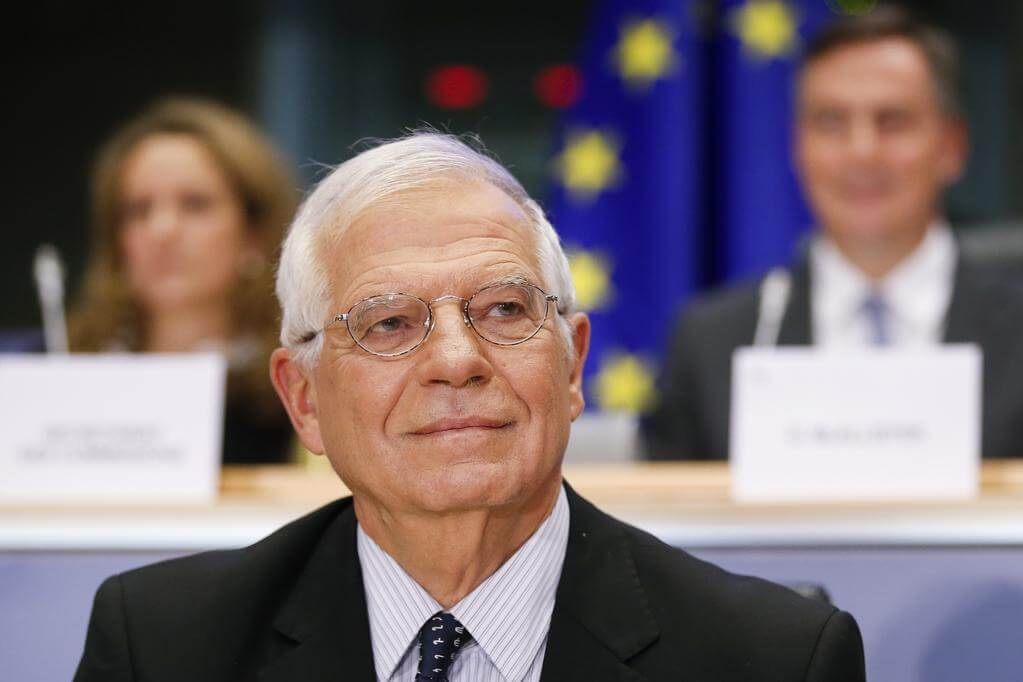European Union (EU) foreign policy chief Josep Borrell on Tuesday proposed a new draft to revive the 2015 Iran nuclear deal, officially known as the Joint Comprehensive Plan of Action (JCPOA).
In an op-ed in the Financial Times, Borrell said that he has “put on the table a text that addresses, in precise detail, the sanctions lifting as well as the nuclear steps needed to restore the JCPOA.” Noting that the Vienna Talks that began in April 2021 between Iran and world powers to restore the JCPOA have failed, Borrell said his proposal “represents the best possible deal” under the current circumstances.
“It is not a perfect agreement, but it addresses all essential elements and includes hard-won compromises by all sides,” Borrell claimed, positing that his proposal provides a “unique opportunity” for all sides to succeed. He insisted that there was “no other comprehensive or effective alternative within reach.”
While Borrell did not elaborate on the specifics of the deal, he stressed that his proposal addresses the concerns of all sides. Hailing the JCPOA as a “cornerstone of the global non-proliferation architecture,” the senior EU leader said restoring the deal would allow the International Atomic Energy Agency (IAEA) to monitor Tehran’s nuclear programme and that sanctions on Iran would be lifted.
Now is decision time if we are to save the Iran Nuclear Deal #JCPOA.
— Josep Borrell Fontelles (@JosepBorrellF) July 27, 2022
Read here my oped, as Coordinator of the Deal, in the @FT: https://t.co/nYhLPoTL9V
“Concluding an agreement now will deliver significant economic and financial dividends as well as strengthen regional and global security. Rejecting it assures a loss on both accounts,” he remarked.
In this respect, he called on Iran and world powers “to immediately return to a fully implemented JCPOA” on the basis of his proposal. “If the deal is rejected, we risk a dangerous nuclear crisis, set against the prospect of increased isolation for Iran and its people. It is our joint responsibility to conclude the deal,” Borrell declared.
Shortly after Borrell’s announcement, Iran’s chief nuclear negotiator, Ali Bagheri Kani, tweeted that Iran has its own ideas on concluding negotiations. He did not elaborate on what they were, but said they would be shared soon.
3. I see why the EU thinks this is the least bad option. It buys time. Perhaps the Dems will keep the House and Senate in November. Perhaps renewed talks after November can yield something resembling assurances to Iran. Perhaps GCC states will step in with investments in Iran. >>
— Trita Parsi (@tparsi) July 26, 2022
Iran has demanded that the US remove all sanctions before the deal can be revived. Tehran has also said that it is still a part of the JCPOA architecture and has accused Washington of exiting the deal, following ex-US President Donald Trump’s decision to unilaterally exit the deal in 2018 and re-impose crippling sanctions.
While Iran has called on the US to remove all sanctions, the US has blamed Iran for taking steps to accelerate its nuclear programme. The US and the European Union (EU) have accused Iran of violating its commitments in the JCPOA and taking escalatory measures that have resulted in a “nuclear crisis.”
The IAEA has also reported that Iran has been enriching uranium to 60% fissile purity, closer to the weapons-grade level of 90%. The 2015 deal stated that Iran could only enrich uranium up to 3.67% for the next 15 years. Furthermore, Tehran has been restricting IAEA officials from accessing its nuclear facilities, which is another violation of the JCPOA.
Ehud Barak: Iran can transform itself into a nuclear power—and it's too late to stop it by surgical attack https://t.co/CnQmUFSgiS
— TIME (@TIME) July 25, 2022
In June, Tehran suspended all contacts with negotiators and the IAEA after the agency passed a resolution censuring Tehran for not cooperating with the organisation and hiding its nuclear activities.
In response to the resolution, Iran shut down 27 IAEA surveillance cameras across nuclear sites. It also announced that it will install two IR-6 advanced centrifuges at the Natanz facility to enhance its ability to rapidly enrich uranium. An IR-6 centrifuge spins uranium ten times faster than other centrifuges. The move could allow Iran to quickly add to its stockpile of enriched uranium, which the IAEA says is sufficient to produce a nuclear weapon.
Israel, too, has accused Iran of pursuing a nuclear weapon and said that reviving the JCPOA would allow Tehran to accelerate its nuclear programme. In fact, former Israeli Prime Minister Ehud Barak warned on Tuesday that Iran is weeks away from turning into a “de-facto threshold nuclear state” and that even an attack is unlikely to deter it. He lamented in an op-ed for TIME: “After more than 20 years of trying, Iran is about to cross the point of no return in becoming a member of the nuclear club.”

